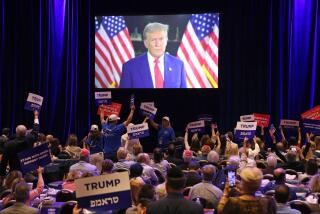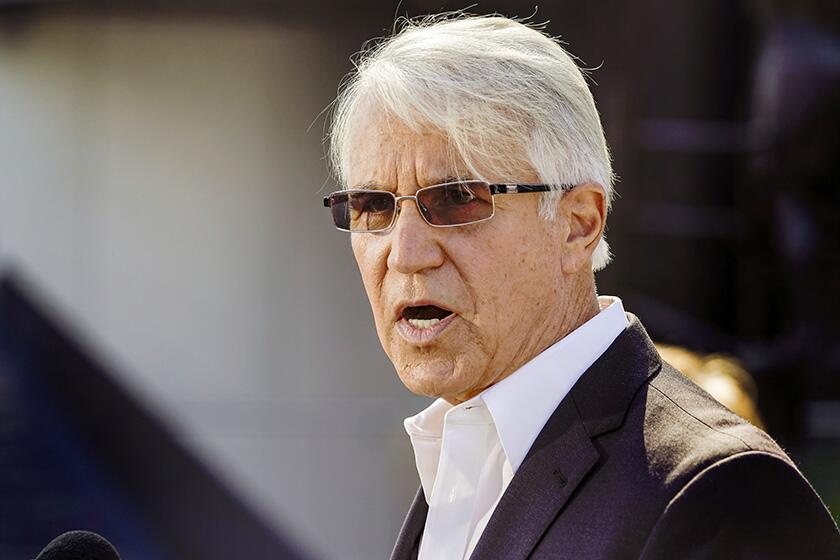The Jewish vote as a factor in U.S. politics
One does not usually think of the conventions of the major U.S. political parties as having any particular impact on Jewish history. But 68 years ago, the Republican National Convention adopted a plank that would shape the future of U.S.-Israel relations and redefine the role of Jewish voters in American politics.
This surprising turn of events was the result of efforts by an unlikely trio: a former president, a maverick journalist-turned-congresswoman and the father of Israel’s current prime minister.
The race for the 1944 GOP nomination was settled early. After his sweeping win in the Wisconsin primary, New York Gov. Thomas Dewey was set to get the party’s nod.
COMMENTARY AND ANALYSIS: Presidential Election 2012
There were, however, several surprises in store when the Republicans gathered in Chicago at the end of June. One was the choice of Connecticut Rep. Clare Boothe Luce to deliver the keynote address — the first time a woman had been given that honor by either major party.
Luce, a former editor of Vanity Fair and war correspondent for Life, was one of the GOP’s rising young stars. The charming and charismatic Luce had a knack for turning a clever political phrase. Her description of postwar liberal visions of a universal world order as “globaloney” instantly became part of the political lexicon.
Former President Herbert Hoover hailed Luce as “the Symbol of the New Generation.”
BLOWBACK: What Jewish voters want -- and what the candidates don’t offer
The other major surprise of the convention was the party’s decision to actively seek the support of Jewish voters. In the presidential elections of 1936 and 1940, 85% of American Jews had supportedFranklin D. Roosevelt. “The problem with you people,” Republican Sen. Arthur Vandenberg once complained to a group of pro-FDR Jewish leaders, “is that every time the Great White Father [Roosevelt] waves his hand, you jump right through the hoop.”
But by the spring of 1944, many Jews were deeply frustrated by the Roosevelt administration’s failure to aid European Jews fleeing the Nazis, and FDR’s refusal to press the British to open Palestine to Jewish refugees.
Even the fervently pro-FDR American Jewish Congress challenged the president. An editorial in its official journal, addressing the Allied leaders, declared:
“You cannot recompense a people for its millions left to be butchered by the enemy through your indifference to their fate and the red tape of bureaucratic approach to the matter of their rescue.” The editorial said those Jews who had managed to escape from the clutches of the Nazis “escape[d] also from the indifference of the democratic nations, from the inhumanity of certain of their policies, from their strict adherence to rigid immigration regulations.”
The growing bitterness in the Jewish community opened the door to Benzion Netanyahu, a young Zionist activist from Jerusalem who had come to the U.S. to mobilize public support for creation of a Jewish state. (Netanyahu, whose son, Benjamin, is Israel’s current prime minister, passed away this year at the age of 102.) At a time when most mainstream Jewish leaders backed Roosevelt and ignored the Republicans, Netanyahu cultivated ties to Hoover, Luce, Sen. Robert Taft of Ohio and other senior GOP figures. He urged them to include a pro-Zionist plank in their 1944 platform. So did Cleveland rabbi and Zionist leader Abba Hillel Silver, who was close to Taft.
In an interview some years ago, Netanyahu told me that on the eve of the convention, Luce called him to say, “I’m going now, to do your work at the convention.”
Luce was a member of the convention’s resolutions committee, and Taft was its chairman. With Hoover’s encouragement, the committee adopted a resolution urging the Allies to “give refuge to millions of distressed Jewish men, women and children driven from their homes by tyranny,” by opening British-controlled Palestine to “unrestricted immigration” and then establishing a Jewish state.
Prominent Jewish supporters of FDR and the Democrats, especially Rep. Emanuel Celler of New York and Rabbi Stephen S. Wise, feared the GOP plank might break the Democrats’ lock on the Jewish vote. At the Democratic Convention in Chicago the following month, Wise warned a Roosevelt administration official that their failure to adopt a pro-Zionist plank to match the Republicans “will lose the president 400,000 or 500,000 votes.”
Wise was referring to the large Jewish population in New York state. With its 47 electoral votes — the largest in the nation at the time — New York would be crucial to FDR’s 1944 reelection bid. The fact that New York’s governor was the Republican nominee meant it might become a battleground state. The party leadership heeded the warnings from Celler and Wise. The Democrats adopted a plank endorsing “unrestricted Jewish immigration and colonization” of Palestine and the establishment of “a free and democratic Jewish commonwealth.” Now both parties stood unequivocally in support of rescue and statehood.
This was the beginning of the “Jewish vote” as a factor in U.S. presidential politics. For the first time, both parties recognized that Jewish votes might be up for grabs, and that Jewish concerns needed to be addressed to attract the support of Jewish voters.
The two 1944 planks also represented the birth of bipartisan support for a Jewish state. With both parties in agreement, the path was clear for America-Israel friendship to become a permanent part of American political culture.
Rafael Medoff is director of the David S. Wyman Institute for Holocaust Studies and the coauthor with Sonja Schoepf Wentling of the new book “Herbert Hoover and the Jews: The Origins of the ‘Jewish Vote’ and Bipartisan Support for Israel.”
More to Read
A cure for the common opinion
Get thought-provoking perspectives with our weekly newsletter.
You may occasionally receive promotional content from the Los Angeles Times.










